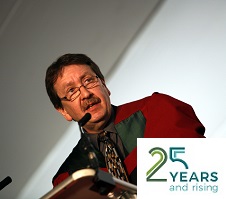Blog

Guest blog: Three into two does go says Steve Wyn Williams, Staffordshire University
04 Apr 2017

The recent recognition of the value of accelerated two-year Honours Degrees by the Universities Minister, Jo Johnson, should be welcomed by all who profess an interest. Although accelerated degrees having been on the HE policy agenda for over twenty years, the intention to mainstream this mode of delivery has always been a minor footnote despite the stated support of previous Labour, Coalition and Conservative governments. The traditional three-year model (with a long summer break) is sacrosanct and deeply rooted.
For over ten years Staffordshire University has been at the forefront of delivering two-year accelerated degrees. As one of the original five HEFCE-funded Flexible Learning Pathfinders (supported by the Higher Education Academy), we have developed considerable expertise in their delivery. Their introduction took place in a less than positive context. The contemporaneous report to HEFCE by SQW - a company carrying out research in economic and social development - on ‘Demand for flexible and innovative types of higher education’ noted that there was very limited interest in this [two-year degree] mode of study’. The University’s own research was more positive; based on a national survey which sought to determine interest in a range of flexible learning options, 70% of the sample reported being very or somewhat interested in the fast-track option.
The model we have developed at Staffordshire University is based on the same course outcomes and curriculum as the three-year ‘parent’ version. Delivery takes place over six teaching blocks with a summer teaching block starting in May, which typically includes a two-week intensive followed by blended learning support. Of course, the success of our accelerated degrees depends on the engagement of dedicated, innovative and supportive staff who in general are very positive about their experiences. As one lecturer noted: “[Fast Track students] want more information, they want more literature to support the teaching, they want more feedback with regards to their assessments, they are your ideal students and I can take my hat off to them because a lot of them have got so many other responsibilities.”
Despite the constraint of charging only two years’ fees for the equivalent of three years’ tuition, we have been committed to growing our provision in a measured way and we now offer nine courses with 150 students currently enrolled. Courses include Accounting and Finance, Business Management, English Literature and Sports Strength and Conditioning.
Two-year accelerated degrees appeal to a wide audience, from those upskilling or looking for a career change to school and college leavers with clear ideas around how they want to study. For both demographics, the attractions of a two-year degree are clear: saving on living costs, rent and other expenses; quicker entry into the graduate job market; and quicker entry into postgraduate study.
Frequent criticisms of accelerated courses refer to the challenges of intensive study, limited opportunities to earn income while studying and the loss of the long summer vacation. These are important considerations and students are fully informed when they apply that focus and commitment are key requirements. However, it is also important to note that the study period during which the focus is on blended learning does allow students to undertake a placement or work and earn some money over the summer period.
Our own research provides some insights into the differences between accelerated degree students compared with students on the equivalent three-year course in terms of approaches to their learning. For example, accelerated degree students tend to attend more lectures, spend more time on independent study, are less likely to ‘cram’ and claim to spend less time socialising. In terms of student outcomes, module results and final degree results are as good as, and in many cases better than, three-year students.
Staffordshire University is committed to excellence in innovative and applied learning, and it is our intention to continue to grow fast tracks as part of our flexible learning offer, recognising that they are not for all students or all subjects. However, before there is a truly level playing field, at a national level there needs to be a concerted campaign aimed at employers, parents and advisors in schools and colleges to increase awareness and dispel inaccurate perceptions of quality, demand and student experience and outcomes.
Steve Wyn Williams
Dean of Academic Policy and Development
Staffordshire University
Follow us on twitter: #25andRising | @stephenwyn